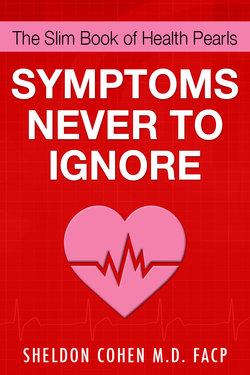Читать книгу The Slim Book of Health Pearls: Symptoms Never to Ignore - Sheldon Cohen M.D. - Страница 6
На сайте Литреса книга снята с продажи.
CHANGE IN BOWEL HABITS
ОглавлениеDIARRHEA is loose, watery stools passed more than three times per day. Most diarrheas will only last two or three days and is self-limiting. Diarrhea lasting more than three days may be a sign of a more serious problem. Diarrhea that lasts at least 4 weeks may be indicative of a chronic medical condition.
Diarrhea may cause dehydration: shortage of body fluids and electrolytes—sodium, potassium, and chloride.
The causes of acute diarrhea are bacteria or viral. Parasitic infections are another cause, but rare in this country. Chronic diarrhea can be a functional disorder such as irritable bowel syndrome, or an intestinal disease such as Crohn’s disease.
The most common causes of diarrhea include the following:
•Bacterial infections including Salmonella, Shigella, E. Coli and Campylobacter
•Viral infections
•Parasites. Less common in the United States, can gain entry to the body by contaminated food and water
•Functional bowel disorders otherwise known as irritable bowel syndrome
•Inflammatory bowel disease such as celiac disease, ulcerative colitis and Crohn’s disease
•Certain food intolerances
•Adverse reaction to medicines such as antibiotics, cancer drugs, and magnesium containing antacids
•Traveler’s diarrhea is a complication of visits to the developing countries of Asia, Africa, Caribbean, Latin America
•Post surgical removal of part of the stomach
Diarrhea is often accompanied by cramping, abdominal pain, nausea, an urgent need to use the bathroom, or loss of bowel control. Some infections that cause diarrhea can also cause a fever and chills or bloody stools.
Dehydration (loss of fluid and electrolytes) can be dangerous in children, older adults and those otherwise chronically ill. If left untreated, it can cause death.
Signs of dehydration in adults include:
•Extreme thirst
•Sudden reduction in urine output
•Concentrated very yellow urine
•Marked fatigue
•Dry skin
•Dizziness and light-headedness that could result in fainting
Signs of dehydration in infants and young children include
•Dry mouth, tongue, skin
•Dry diapers for three or more hours
•Sunken eyes, and sunken soft spot on the skull
•Elevated temperature
•Listlessness or irritability
Severe dehydration may require hospitalization.
The development of loose bowel movements or diarrhea that persists for six weeks mandates investigation to rule out cancer.
